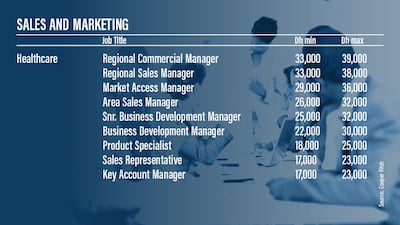Recruiters have seen a steady rise in vacancies in the past two months – with roles in finance, marketing, health care and education most in demand.
The National canvassed recruitment companies across the country which said they expected the job market to rally in late 2020 and early 2021.
In some sectors, jobseekers looking for mid-level to senior positions are willing to take a salary cut up to 30 per cent to stay in the region.
The trend is a reflection of the economic turmoil caused by the coronavirus pandemic in many residents’ home countries – and, more positively, a fall in the price of renting a home.
Demand for nurses and hospital administrators, who can earn Dh8,000 to Dh17,000 per month , remains strong, while cybersecurity analysts can earn Dh30,000 or more.
“We have seen a big shift in vacancies and hiring over the past six to eight weeks,” said David Mackenzie, managing director of recruitment firm Mackenzie Jones.
“It is exactly like it was in 2008 and 2009. There was a big dip then a sudden uptake, which we are expecting by the end of the year.”
“At the moment we are more focused on opportunistic recruitment.”
Redundancies and non-renewal of contracts has led to many expats departing in the past few months, though some have begun to return in recent weeks.
In turn, that has resulted in jobseekers being “more pragmatic about their salaries”, Mr Mackenzie said.
“Salaries have fallen by about 30 per cent across the board,” he said.
“As an example, an HR director who was on about Dh70,000 to Dh80,000 per month in the UAE is now willing to take about Dh50,000 to stay in the country.
“We mainly recruit for mid to senior-end jobs but a lot of people have returned to their home countries and we are struggling to fill some roles.
“I think by Q1 of 2021 we will be casting our net externally again, particularly in Europe.”
Most employers looking for new staff have focused on hiring locally due to visa and travel restrictions.
____________________
The National's 2020 jobs guide recap
____________________
As a result of the pandemic, Mackenzie Jones Group has lost about 30 per cent of its recruitment database.
At present, the most in-demand roles on offer are typically better paid, with the top five being in finance and marketing, digital technology, consumer goods, health care and education.
“We have a couple of school start-ups on our database that we have been staffing from scratch, from teachers to administration and marketing roles,” he said.
Mayank Patel, country manager for global recruiter The Adecco Group, said the construction, property, retail and hospitality were the sectors hit hardest by the pandemic.
But it has led to a shift in demand IT, e-commerce, logistics and pharma roles.
“We’ve seen an increase in the hiring numbers for the IT sector and there is a demand for skilled professionals such as software engineers, finance managers, cybersecurity experts and financial planning analysts,” he said.
Healthcare roles, mainly nurses and administration positions, have also been part of that uptake.
As per an online job search, salaries for these roles typically range from about Dh8,000 per month to Dh17,000, depending on position and experience.
Louise Knight, business manager at Gulf Recruitment Group, said the sort of candidates she would usually see looking to move up in their careers have stayed in their current roles for stability.
“They are moving around less until the market gets more stable,” she said.
“Salaries are more stagnant, candidates are being more pragmatic and some are willing to take up to 25 per cent less to secure a role to stay in the region. Many people have gone into survival mode.”
The sharp decline in vacancies and hiring over the past few months reflects the impact of closed offices and reduced hospitality services across the country due to Covid-19.
But with tourism picking up and restrictions eased, businesses are slowly beginning to operate as normal again, which should lead to another recruitment shift by the end of the year.
Jon Ede, regional director for Michael Page Middle East, said he was still seeing demand for high-end niche roles.
“Positions particularly within digital, legal, financial services, healthcare and life sciences for example do continue to have certain niche talent shortages and strategic growth plans,” he said.























































